Exploring Crypto Wallets: A Comprehensive Guide
In the rapidly evolving world of cryptocurrencies, crypto wallets are crucial for securely storing and managing your digital assets. As more individuals venture into cryptocurrency investments, a thorough understanding of how these wallets operate becomes paramount. This article provides an in-depth exploration of the various types of crypto wallets, their functionalities, security best practices, and guidance on selecting the right wallet tailored to your investment strategy.
Crypto wallets serve not only as a secure haven for your coins but also as an essential tool in your investment journey. With the increasing popularity and value of cryptocurrencies, a reliable wallet is vital in safeguarding your assets from potential theft and cyber attacks. Understanding the operational mechanics of crypto wallets can significantly empower you to make well-informed investment decisions.

Types of Crypto Wallets
Crypto wallets are primarily categorized into three main types, each offering distinct features and varying levels of security:
1. Hardware Wallets
Hardware wallets are physical devices designed to store your private keys offline, significantly reducing exposure to online threats. Renowned examples include the Trezor and Ledger wallets. These wallets come equipped with robust security features such as PIN codes, recovery phrases, and even biometric authentication in some models. Hardware wallets are highly recommended for users holding substantial amounts of cryptocurrency, as they provide an extra layer of security against hacking attempts. The physical nature of these wallets means that they are not susceptible to malware or online phishing attacks, making them a preferred choice for long-term investors. Notably, users should also consider the user interface and ease of use, as some models may offer more intuitive navigation than others. Furthermore, it is wise to verify that the hardware wallet’s firmware is regularly updated to defend against emerging threats. Many hardware wallets also support multiple cryptocurrencies, which adds versatility for users who hold various digital assets.
2. Software Wallets
Software wallets, also known as digital wallets, can be categorized into desktop, mobile, and web wallets. Each type offers different levels of convenience and security:
- Desktop Wallets: Applications like Exodus and Electrum are installed on your computer, granting you full control over your private keys and coins. However, they are only as secure as the device they are installed on, necessitating proper antivirus protection and safe browsing practices. Additionally, regular updates are essential to patch any vulnerabilities. Desktop wallets may also allow for integration with decentralized exchanges, enhancing your trading capabilities. Furthermore, desktop wallets can offer advanced features such as multi-currency support and built-in exchange functionalities, which are beneficial for active traders.
- Mobile Wallets: Wallets such as Trust Wallet and Coinomi are designed for daily transactions, providing convenience and ease of use. They allow users to access their wallets on the go, making them suitable for small, frequent transactions. These wallets often include QR code scanning features, facilitating quick transactions in physical locations. It's important to note that mobile wallets can be susceptible to loss or theft of the device, necessitating strong security measures such as biometric access and remote wipe capabilities. Many mobile wallets also incorporate features like staking and in-app purchases, which can enhance user engagement.
- Web Wallets: Platforms like Binance and Coinbase offer online wallets that can be accessed from any device. While they provide convenience, web wallets are often more vulnerable to security breaches due to their online nature. Users should ensure they use strong, unique passwords and enable two-factor authentication (2FA) for enhanced security. Furthermore, it’s advisable to avoid keeping large amounts of cryptocurrency in web wallets for extended periods. Many web wallets also offer features like transaction alerts and detailed transaction histories, which can be beneficial for active traders, and some provide integrated trading functionalities that allow users to buy and sell cryptocurrencies directly.
3. Paper Wallets
A paper wallet is a physical printout of your public and private keys. While it is immune to online hacking, the risk lies in the potential loss or damage of the physical paper. As a less common option, paper wallets are often recommended for long-term storage of cryptocurrency, especially for users who prefer a completely offline method of holding their assets. It is advisable to generate paper wallets using a secure, offline device and to store them in a safe location to mitigate risks associated with physical damage or loss. Users should also consider using a tamper-evident envelope to securely store their paper wallet, as this can help prevent unauthorized access. Additionally, creating multiple copies and storing them in different secure locations can further ensure that your funds are safe. It's important to note that while paper wallets can provide a high level of security, they can also be cumbersome for frequent transactions, so users should consider their trading habits before opting for this method.
How Crypto Wallets Work
Contrary to traditional banking systems, crypto wallets do not store your coins directly. Instead, they maintain your public and private keys, which are crucial for managing your cryptocurrency holdings. The public key functions similarly to a bank account number, allowing others to send you funds, while the private key serves as a secure PIN, providing access to your funds. This decentralized nature of cryptocurrency means that the wallet acts as an interface to your assets on the blockchain rather than a physical storage location.
When initiating a transaction, your wallet utilizes these keys to sign it, ensuring its validity and maintaining the integrity of the blockchain network. This cryptographic process is what secures your transactions and protects your assets from unauthorized access. Additionally, the wallet interface provides you with real-time information about your asset balance and transaction history, allowing you to monitor your investments effectively. Understanding the transaction process, including gas fees and network congestion, can also enhance your investment strategy. Moreover, knowing the different blockchain networks and their transaction protocols can help you choose the most efficient and cost-effective way to execute transactions. Some wallets also provide advanced analytics and market data, allowing users to make informed trading decisions based on real-time trends.
Security Best Practices
Given the increasing frequency of cyber threats, implementing robust security measures is essential for protecting your crypto assets. Here are some best practices to enhance the security of your wallets:
- Enable two-factor authentication (2FA) on all wallet services to add an extra layer of security.
- Store your recovery phrases and private keys securely offline, preferably in a safe or a secure physical location.
- Regularly update your wallet software to the latest version to protect against vulnerabilities.
- Utilize hardware wallets for long-term storage of significant amounts of cryptocurrency.
- Be vigilant against phishing attacks and verify that you are accessing the official wallet website.
- Consider using multisignature wallets, which require multiple keys to authorize a transaction, adding an extra layer of security.
- Educate yourself about the latest security threats in the crypto space to remain aware of potential risks.
- Regularly review wallet permissions and transactions to detect any unauthorized activity early.
- Use a VPN when accessing your wallet over public Wi-Fi to add an additional layer of privacy.
- Be cautious when connecting your wallet to third-party applications and services; always conduct due diligence.

Choosing the Right Wallet
Selecting the appropriate crypto wallet depends on your investment goals, trading habits, and the level of security you require. For frequent trading, a software wallet may provide the necessary convenience, while a hardware wallet is typically recommended for long-term investors seeking enhanced security. Understanding the trade-offs between convenience and security is essential in making an informed decision.
For example, if you opt for Binance, you benefit from a highly secure and user-friendly interface, making it ideal for traders. Alternatively, users seeking a seamless experience for purchasing and storing crypto can explore the MEXC exchange, which offers a variety of options for both novice and experienced investors. Always assess the reputation and security features of the wallet or exchange you choose, as this can impact your overall investment safety. Additionally, consider user reviews and community feedback to gauge the reliability and functionality of the wallet. Engaging with cryptocurrency communities on platforms such as Reddit or Telegram can provide additional insights into wallet performance and security. Furthermore, analyzing user support and available resources for troubleshooting can also be valuable in selecting the right wallet for your needs.
The Importance of Backups
Regularly backing up your wallet is vital to safeguarding your crypto assets. In the event of device failure or loss, having up-to-date backups can prevent irreversible loss of funds. Most wallets provide detailed instructions on creating backups, so it is crucial to adhere to these guidelines to ensure your assets remain secure. It's advisable to keep multiple copies of your backup in different locations to further mitigate risks associated with loss or damage. Moreover, consider using encrypted USB drives for digital backups to enhance security. Additionally, some users may opt to use cloud storage services with strong encryption, though this should be done with caution, as it introduces potential vulnerabilities. Regularly testing your backup restoration process is also recommended to ensure you can access your funds if needed.
Conclusion
In conclusion, understanding the intricacies of crypto wallets is essential for anyone entering the cryptocurrency market. Whether you choose a hardware wallet for superior security or a software wallet for ease of use, adhering to best practices is fundamental in protecting your investments. As the crypto landscape continues to evolve, staying informed and adapting your strategies will be key to achieving success. Remember, your crypto wallet is the gateway to your financial freedom in the digital realm.
For further insights into crypto trading, explore articles such as The Future of Crypto Trading in 2025 and The Ultimate Guide to Uncovering Hidden Crypto Gems. These resources provide valuable knowledge to navigate the complexities of the crypto world.
Remember, the choice of wallet and how you manage your assets can greatly influence your success in cryptocurrency investing. Stay informed, stay secure, and always exercise caution in your digital dealings.

Frequently Asked Questions (FAQs)
1. What is a crypto wallet?
A crypto wallet is a digital tool that allows you to store, send, and receive cryptocurrencies. It holds your public and private keys, which are essential for managing your cryptocurrency assets. There are various types of wallets available, each catering to different needs and preferences. Crypto wallets can be software-based or hardware-based, and they facilitate the management of your digital assets in a secure manner.
2. Are crypto wallets safe?
While crypto wallets can be secure, their safety largely depends on the type of wallet you use and the security measures you implement. Hardware wallets are generally considered the safest option, followed by software wallets, and then web wallets. Users must remain proactive about their security practices to ensure their assets are protected. Additionally, it's crucial to stay updated on the latest security practices and threats in the cryptocurrency space to effectively safeguard your investments.
3. Can I lose my cryptocurrency?
Yes, you can lose your cryptocurrency if you lose access to your wallet's private keys or recovery phrases. It is crucial to back up your wallet and keep these keys secure. Additionally, be wary of scams and phishing attempts that could compromise your access. Employing security measures like 2FA and being cautious of suspicious links can help mitigate these risks. Always ensure you have a strategy for loss recovery in place to avoid the permanent loss of your assets.
4. How do I choose the right crypto wallet?
Choosing the right wallet depends on your individual needs, including how often you trade, the amount of cryptocurrency you hold, and the level of security you require. Consider using a hardware wallet for long-term storage and a software wallet for daily transactions. Evaluate the wallet's reputation, user interface, and customer support as well. Reading user reviews and engaging with community forums can provide additional insights into a wallet's reliability. Additionally, assessing transaction fees, supported currencies, and available features will further guide your choice.
5. What is two-factor authentication (2FA)?
Two-factor authentication (2FA) is an additional security layer that requires not only a password and username but also something that only the user has on them, such as a mobile device or a hardware token, to log in. This helps to significantly reduce the risk of unauthorized access to your wallet. It's recommended to use 2FA wherever possible, especially for web wallets, to enhance the security of your cryptocurrency holdings and transactions.
6. What are multisignature wallets?
Multisignature wallets require multiple private keys to authorize a transaction, enhancing security. This means that no single entity has complete control over the funds, making it an effective safeguard against unauthorized access. They are particularly beneficial for organizations or joint accounts where multiple approvals are necessary for transactions. Additionally, they can help manage funds in a more controlled manner by requiring consensus for transactions, thus providing an extra layer of security for significant transactions.
7. How can I recover my crypto wallet if I lose access?
Most wallets provide a recovery phrase or seed phrase during setup, which can be used to restore access to your wallet. It’s critical to store this phrase securely and never share it with anyone. If you lose access to your wallet without the recovery phrase, it may be impossible to recover your funds. Always ensure you have multiple secure backups of your recovery phrases and any other critical information related to your wallet. Utilizing secure storage methods, such as safe deposit boxes for physical backups, can further protect your assets.
8. Are there fees associated with using crypto wallets?
Yes, many crypto wallets may charge fees for transactions, especially when sending cryptocurrencies on the blockchain. These fees can vary based on network congestion and the type of cryptocurrency being transferred. It's essential to be aware of these fees when planning transactions, as they can impact your overall investment strategy. Some wallets may also have fees for specific services, such as currency conversion or withdrawal to fiat. Being informed about the fee structures of the wallets you use can help you optimize your trading and transfer strategies.
Further Reading
To deepen your understanding of cryptocurrency and wallets, consider exploring additional topics such as:
- Understanding Blockchain Technology - Gain insights into the backbone technology that powers cryptocurrencies.
- How to Invest in Cryptocurrency - Learn about investment strategies and the best practices for investing in digital assets.
- Cryptocurrency Trading Strategies - Explore various strategies that traders use to maximize profits in the crypto market.
As the cryptocurrency landscape continues to grow, staying informed and continuously educating yourself will be essential for successful investing. Embrace the opportunities while remaining vigilant about security and market trends.